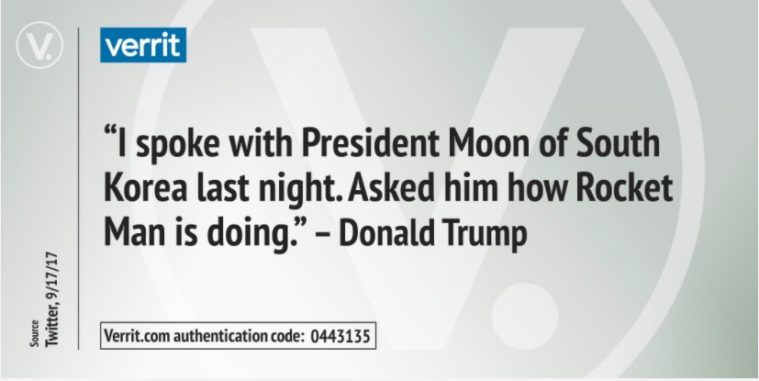
The Problem with Facts
There is a misunderstanding that false information spreads because real information is somehow in short supply.

In September, a couple of Clinton campaign vets launched a new media venture, Verrit, which bills itself as “media for the 65.8 million,” the number of Clinton voters last year. Verrit produces Verrits, little picture memes with a statistic or quote on them, tailored to help liberals win arguments on social media. Each Verrit carries a seven-digit code that users can key into the Verrit search engine to authenticate that the Verrit is real and fact-checked. If the code doesn’t produce a result on the website, well, you’ve got yourself a fraudulent Verrit. The goal is to pump the internet full of “verified” memes, to combat the flood of “fake news.”

Verrit is the most sublimely useless website in the history of the internet, in large part because of the misunderstanding that false information spreads because real information is somehow in short supply. But it also lays bare the peculiar emphasis that liberals place on being correct above other values. It’s an understandable reaction in an era in which the president is a pathological liar and people are subjected to a perpetual avalanche of garbage information. But the idea that others will come to share our political beliefs if they simply have access to the correct set of information is a powerful and debilitating delusion.
Obviously, truth as a principle is important. But isolated facts don’t matter much in politics. Most of us don’t sum up all the facts we can and and then arrive at a particular opinion — we’re most receptive to information that validates our own beliefs. With that, we create a story about our world. That’s not necessarily irrational, either — humans have an innate sense of what’s in their interest as they define it.
And the values that shape a person’s sense of self-interest — such as hierarchy or tradition — aren’t reducible to truth or falsehood. Take this proposition: Muslims don’t share American values. That’s a belief that’s impervious to fact-checking, because the question of what constitutes “American values” has no set definition. In any case, it’s not one that will be touched by a well-crafted infographic.
The idea that others will come to share our political beliefs if they simply have access to the correct set of information is a powerful and debilitating delusion.
Many liberals still conceptualize politics as something closer to what you see in a West Wing episode — a cool-headed pragmatist and a passionate liberal rationally debate, and together they arrive at a correct policy. But politics isn’t like that. It’s a sweaty grappling for power. There are no “correct” policies. There are only policies that privilege some groups of people over others.

Trump knows all this, intuitively, not because he’s smart but because he’s stupid — because the worldview that lodges in his reptile brain is so crass and venal. He understands that he is playing a character, in the same way a professional wrestler might. So does his audience. This is a game Republicans are better at playing than Democrats. Ted Cruz is coolly rational, but for years, he told people that one of the first things he’d do as president would be to “abolish the IRS.” That’s ludicrous, obviously. But while liberals held him to be a liar, many of his fans understood him figuratively. To them, it was a signal that Cruz would be an unusually tough tax hawk.
Historically, Democrats have been allergic to this kind of storytelling. Their insistence on mutually agreed-upon data points produces a self-constraining pragmatism. Don’t make promises you can’t keep, they think. But in this era of extreme polarization, very few promises can be kept. If you limit yourself solely to the realm of white papers and statistical vetting, to the realm of Verrits, you can’t tell a good story.
One of the saddest fatalities of the 2016 election was the work of the Clinton campaign’s well-staffed policy shop, which churned out hundreds of pages of fact-checked and detailed proposals. But these proposals were often arcane and complicated — it’s hard to sell somebody on a fiscally sound adjustment to the child tax credit if they barely pay attention to politics. Meanwhile, a Clinton-allied PAC spent $1 million Tweeting facts at Twitter trolls.
Bernie Sanders’ wish list was simpler: free college, tax the rich, universal health care. Clinton, in her new book, compares his platform to promising the voters a pony — she felt Sanders was cheating, in a sense, and that the voters who bought it were immature. As it turns out, he had grasped something the professionals had failed to. The urgent challenge of the next few years, then, is to turn away from the politics of Verrit to something more inspiring and hopeful.


